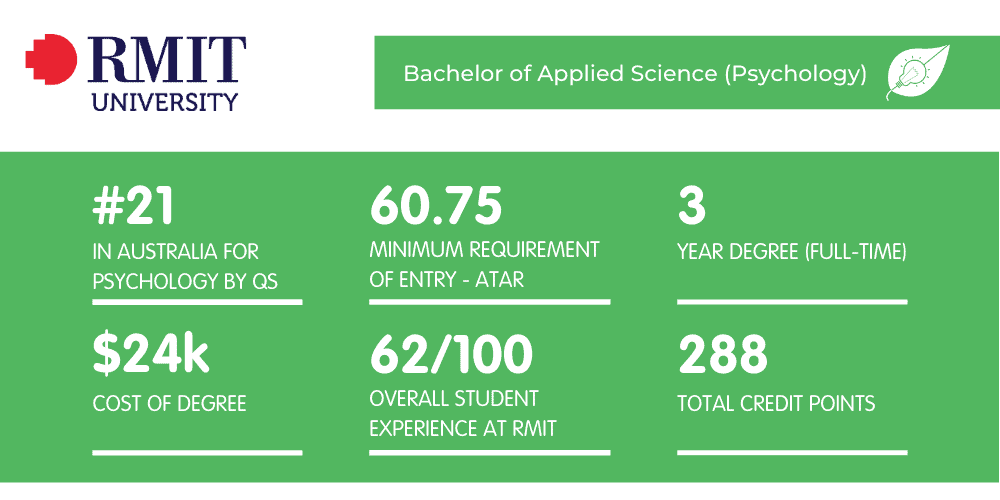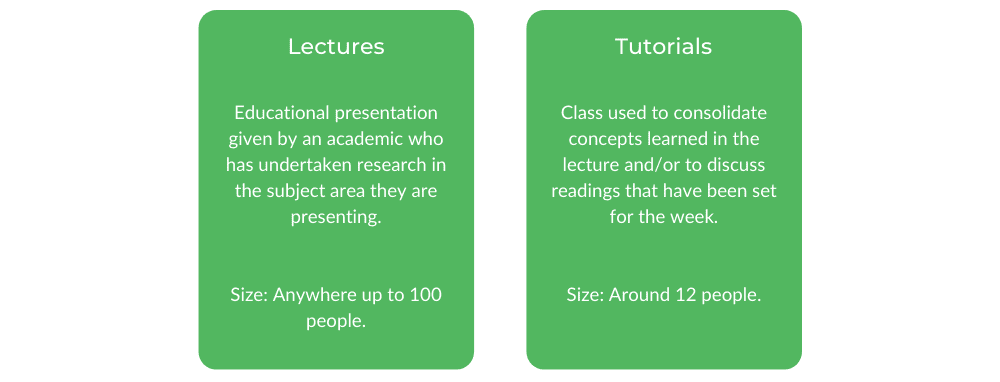So, you’re interested in studying a Bachelor of Applied Science in Psychology at RMIT?
Well, you’ve come to the right place because we’re going to take you through everything there is to know about this degree including the core subjects, assessments, uni culture, scholarships and more!
Let’s take a closer look!
What is a Bachelor of Applied Science (Psychology) at RMIT?
Degree Structure
How to Get into Psychology at RMIT
What’s the Teaching Format?
What’s the Faculty and Culture Like?
What is a Bachelor of Applied Science (Psychology) at RMIT?
A Bachelor of Applied Science in Psychology at RMIT provides you with a good understanding of the history, different theories and perspectives of psychology. There’s a strong focus on conducting scientific research and interpreting scientific literature.
In the final year, you have the choice to either complete a research project or a placement — it’s up to you depending on whether you’re more interested in the research side of psychology or perhaps you want to go on to become a clinical psychologist.
Either way, this degree is accredited by the Australian Psychology Accreditation Council and it’s the first step if you want to become a registered clinical psychologist (you would then have to go on to do Honours and Masters).
Can it be studied with another degree or completed as Honours?
While you can’t study another degree with a Bachelor of Applied Science in Psychology, there is the possibility to complete an Honours year where you’ll cover more professional theories and issues in depth as well as develop your research skills through an individual research project.
If you’re interested in studying Psychology at RMIT, they also have a few other interesting degrees including Criminology and Psychology, Social Science (Psychology) and Social Work (Honours) and Social Science (Psychology).
Career Paths
By studying a Bachelor of Applied Science in Psychology, you’re well on your way to becoming a registered psychologist — add on a year of Honours and a Master of Clinical Psychology and you’re there!
However, that’s not the only career path this degree leads to- check out some of the possibilities below:
-
- Clinical psychologist
- Counsellor
- Researcher
- Case manager
- Child care worker
- Rehabilitation specialist
- Corrections officer
- Employment interviewer
Degree Structure
Over the three years, you’ll complete 18 core subjects! In the first year and second year, you get to choose one subject from a selection of more specialised psychology subjects (in the third year, it’s two!).
In terms of electives and having the flexibility to choose from a wider range of subjects, you get one free-choice elective in the second and third year. Now that we got through that — let’s take a closer look at some of the really interesting content you’ll actually learn about!
What are the Core Units?
There’s a whole range of different subjects that you’ll dive into where you’ll learn about the history, theories and approaches of psychology, the more biological and neuroscience side of it, a bit of philosophy, how to conduct scientific research and even some statistics!
The subject Psychotherapy and Models of Intervention is an introduction to psychological disorders and different approaches used by psychologists to manage these. So, you’ll gain a thorough understanding of depression, anxiety and personality disorders.
In Understanding Personality, you’re encouraged to think about how personality is influenced by the world around us in terms of social, cultural and political factors. Motivation and Organisational Psychology focusses on the well-being and behaviour of individuals and groups in organisations so you’ll look at employee recruitment, strategies for interviewing and goal-setting as well as how to encourage employees to embrace change.
Now Statistical Computing is an interesting one! In this subject, you’ll learn how to use SPSS (Statistical Package for Social Sciences) which is a program used in the industry for statistical analysis!
Subject Choices
There are some fascinating subjects you can choose from — it’s basically where you have to choose a subject out of a selection provided for you (they all relate to psychology).
In the first year, you can choose from The Science of Human Nature, Applied Psychology Topics (related to the psychology of health and exercise) and Foundations of Artificial Intelligence for STEM.
Now for the second year, you’ll either do Forensic Psychology or Psychology of Gender and in the third year, you’ll complete whichever you didn’t do in second year! It’s also good to know that you have a choice between conducting a Research Project or completing at least 120 hours of placement in the third year — unfortunately you can’t do both!
Placement
So, we did just mention this above but it’s true — you’ve got to choose between either a research project or psychology field placement! So, we’re going to run you through what each one involves in detail!
Basically with the research project, the final product is you submitting an academic journal article so you’ll have to conduct your own research, analyse it and write it all up! It’s great practice if you’re thinking of doing Honours.There’s different topics provided for you to choose from or you can choose your own!
Now, in terms of the placement, you’ll complete at least 120 hours at a clinic or health-focused organisation. There’s a few introductory activities and assignments that you have to do along the way including a professional development plan and self-reflection essay.
How to Get into Psychology at RMIT?
You’ll need an ATAR of 60.75 for guaranteed admission into Applied Science in Psychology at RMIT.
Adjustment Factors
If you don’t have the required ATAR, check out the adjustment factors because you might be eligible for some bonus points! Though, keep in mind that you can’t add more than 7 points onto your ATAR.
-
- Mathematics: study score of 25 = 2 points
- Biology, Health and Human Development or Psychology: study score of 25 = 1.5 points
- English (EAL): study score of 35 = 1 point
- English (other than EAL): study score of 30 = 1 point
You can find more info on adjustment factors here!
Requirements
You’ll need to have completed Australian Year 12 or the equivalent of it!
To be eligible for the degree, you’ll also need to have completed:
-
- Any mathematics units 1 & 2: satisfactory completion
- English (EAL) units 3 & 4: scored at least 30 OR
- English other than EAL units 3 & 4: scored at least 25
- Any mathematics, science or geography: scored at least 20
Scholarships
There are all sorts of different scholarships you can apply for at RMIT which can be found here!
If you happen to be moving to Melbourne to start uni at RMIT, it’s worth checking out the Atira Accommodation Support Scholarship.
What’s the Teaching Format?
A Bachelor of Psychology at RMIT is taught through lectures and tutorials. Luckily for you, the calendar year at RMIT is spread across semesters, so you’ll have lengthy breaks in between each academic session!
Class Structure
Lectures
At the start of the semester, you’ll have around 100 people in a lecture (and that usually decreases as the weeks go by). They last for around two hours — you’ll cover all the theory so the history, practices and interpretations of psychology. Be ready to write some good notes!
Tutorials
The tutorials are fairly small in size because they’re split up so you can expect to have around 12 people in your class. A fair bit of discussion happens in these classes with lively debates about different interpretations and whether you agree or disagree with them.
You’ll discuss the lecture material and work on group assignments — sometimes, you’ll have a group presentation for a certain week you’ve been assigned.
How much time do you spend on campus?
If you study a Bachelor of Applied Science in Psychology at RMIT full-time, you’ll take four subjects a semester. For each subject, you’ll have around four contact hours which totals to 16 contacts hours a week!
You’ll also have to spend quite a few hours doing work in your own time — there’s readings, theories to revise, exam preparation and assignments!
What are the assessments like?
There’s a mixture of hand-in assignments and exams! You can expect to have around three assignments and then one exam for each subject.
So, there’s essays, presentations, lab reports where you have to analyse the data and write up the results section and of course, group assignments!
Skills That You Refine and Learn
As this degree is a stepping stone for those wanting to become clinical psychologists or work in areas of mental health, you’ll develop skills in terms of how to speak with people, how to understand different personalities and pretty much, what has influenced someone to be the way they are.
You’ll develop your communication and research skills, both in writing and presenting! You learn how to write in an academic and professional way, how to summarise ideas from journal articles and express those ideas.
What’s the Faculty and Culture Like?
Faculty
There’s a very low chance that you’ll ever be bored in class because they are filled with interesting debates and discussions.
The lecturers and tutors encourage you to share your opinion and think critically about what you learn, especially because they have a range of different perspectives!
A lot of the tutors work as clinical psychologists and also teach which means you’re learning from people in the industry and it’s a great chance to ask any questions that you may have about a career in psychology.
Culture
In terms of the culture, it’s very friendly and there’s always something interesting to discuss — whether that be the latest book you had to read for class or your different interpretations of content from a lecture!
It’s definitely worth checking out the Psyched Psychology Society who run a whole range of exciting events! There’s post grad talk nights, movie/bar nights and of course, the Psyched Ball!
Curious about the pros and cons of this degree? Check out our article here!
Tanna Nankivell is a Senior Content Writer at Art of Smart Education and is currently in Germany completing a year of study for her double degree in Communications (Journalism) and Bachelor of Arts (International Studies). She has had articles published on Central News – the UTS Journalism Lab and wrote a feature piece for Time Out Sydney during her internship. Tanna has a love for travel and the great outdoors, you’ll either find her on the snowfields or in the ocean, teaching aqua aerobics or creating short films.






